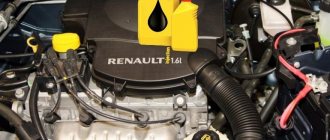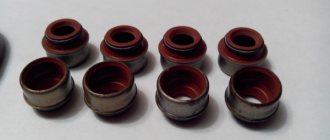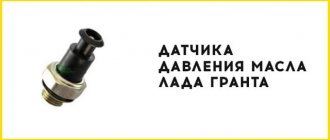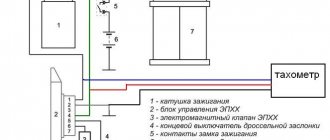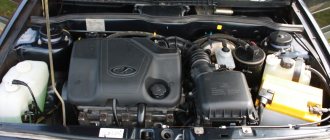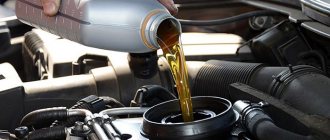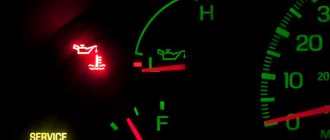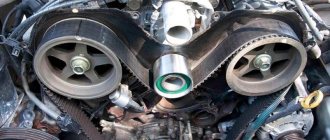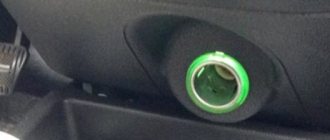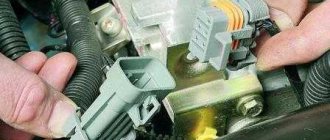Possible causes of knocking in the engine
To accurately find the cause, a qualified inspection of the internal combustion engine is necessary using special diagnostic equipment. The main reasons that occur most often:
- Defects received during the manufacture of a car (on a new car).
- Poor quality repairs (for example, in a regular garage).
- The engine crankcase is filled with the wrong brand of engine oil.
- Using low-quality gasoline or diesel fuel.
- Violation of vehicle operating rules (motor overload, aggressive driving, etc.).
A knocking sound appears in the engine for no apparent reason; this occurs after a long run, as a result of gradual wear of working units and parts exceeding the maximum permissible values. If unusual sounds occur, the technician must make sure that it is not the gearbox or other transmission mechanism that produces them, but the engine. Based on the nature of the sound, an experienced mechanic determines the location and degree of complexity of the breakdown. This applies to internal combustion engines of any type: carburetor, injection, diesel.
Why does the engine start knocking?
First of all, you need to understand that both the engine itself and the attachments can knock. For example, the owner may hear noise and knocking from the pump, generator, power steering pump, etc. If we talk about the engine itself, knocking noises can appear as a result of wear or damage to the connecting rod bearings, pistons, in case of problems with the timing belt, etc.
So, if knocking suddenly appears in the engine, the main reasons may be:
- decrease in engine oil level or loss of its properties;
- the engine began to overheat for one reason or another;
- the power unit is worn out, there are problems with the CPG and the crankshaft;
- Often knocking noises are heard only when cold, but disappear after warming up. Note that in this case, on some internal combustion engines, the knocking of the pistons in the cylinders is heard when cold. The reason is that the cylinder liners are worn out, which leads to the formation of a gap between the piston and the cylinder wall.
However, given that the pistons are aluminum, they expand after warming up. It is not difficult to guess that after expansion the gap becomes smaller and the knocking in the engine disappears when it is hot. Also, on a cold engine, the timing chain may make noise.
The fact is that the oil pressure after starting the internal combustion engine is insufficient. If a hydraulic timing chain tensioner is designed, the tension is simply not enough and noise appears, which will disappear with warming up.
- Now let's move on to the problem of engine knocking after reaching operating temperatures. Let us immediately note that if the engine knocks “when hot,” the problems may be more serious compared to the noise of an unheated internal combustion engine.
First of all, the crankshaft or CPG parts may be knocking. This indicates a lot of wear. In a nutshell, while the engine is cold, the oil is less fluid and not as diluted. In fact, the lubricant fills the gaps that have increased due to wear.
As a result, there is no knocking in the mating pairs after starting a cold engine. However, as the power plant warms up, the oil becomes liquid and knocking begins to appear, quite clearly.
Knocking when hot can also occur when the piston pin cracks, or if cracks have formed on the piston skirt. One way or another, a knocking sound in the engine after warming up requires stopping operation and immediate diagnosis.
- Another common problem is engine knocking at idle, that is, when the engine (regardless of the degree of warming up) is idling. If you raise the speed, the knocks and noises disappear or become less intense.
Let us immediately note that knocking at idle can indicate either that a part is touching another due to vibrations (for example, covers, casings, etc. may be knocking), as well as backlash in various pulleys, gears and drives.
As you can see, there are many reasons for engine knocking, for this reason it is important to localize the source as accurately as possible. Now let's look at the most common problems and look at the most common sources of engine noise in more detail.
Knock in the cylinder head
Usually, when it comes to knocking in the cylinder head area, valves or hydraulic compensators are most often knocking. Also, valve knocking can be heard on engines with hydraulic valves, and not only in units that have mechanical valve drives.
One way or another, the knocking of hydraulic compensators must be eliminated with an additive, flushing or replacement, and the valves must be adjusted. If these procedures do not help, then there is a high probability of wear on the camshaft cams.
It should be remembered that the valve bushings and seats wear out in the head, and the camshaft bed gradually develops. The knocks on the cylinder head themselves can vary in tone from ringing high-frequency to low and rumbling.
Primary diagnosis of engine knocking
To make sure that unusual sounds are coming from the motor, you need to:
- install the vehicle above an inspection hole or on an overpass;
- depress the clutch pedal;
- disconnect the engine from the gearbox and transmission;
- check the condition of parts and components that are the most likely culprits for the appearance of extraneous knocking noises (engine mounts, water pump, generator, etc.);
- dismantle parts that cause suspicion;
- If the unusual sounds do not stop, this means that the main problem is in the motor itself.
Types of engine knocks
Experienced auto mechanics can distinguish non-standard extraneous sounds that appear during operation of an internal combustion engine by hearing based on a number of signs:
- The strength of the blows.
- Increasing intensity of sounds.
- Harmonic frequency.
- Cyclicality.
Depending on the strength of the sounds coming from the operating unit, it is recommended to perform the following actions:
- if the impacts are very strong and cannot be damped by any available means, it is best to turn off the engine and deliver the vehicle using a tow to the nearest service station;
- with medium impacts, which are not audible when you turn on music in the car interior, it is allowed to slowly move independently to the repair shop;
- It is possible to diagnose the cause of the impacts not immediately if the noises coming from the internal combustion engine with the hood open in conditions of complete silence are barely audible.
What to do in such a situation
It is important to understand that there is nothing good about valve knocks on a hot engine. The simplest solution would be to go to the nearest car service center, where specialists will check and fix everything.
But some people find it interesting and even useful to delve into the car themselves and gain new experience and knowledge. Someone will first have to read a lot of literature and technical documentation. Others will watch the video and easily repeat the manipulations done.
Although a similar problem occurs on many cars, it is the owners of inexpensive or quite old cars who prefer to take on knocking valves themselves, such as:
- Renault Logan;
- Chevrolet Niva;
- VAZ 2114;
- Lada Priora;
- VAZ 2106;
- Ford Focus;
- VAZ 2109;
- Opel Astra;
- Daewoo Nexia;
- Nissan Almera;
- Renault Sandero;
- Cherry Amulet, etc.
Don’t think that solving a knocking problem is very easy. If you make a mistake, you will only increase the noise and cause the situation to worsen. Therefore, beginners are not recommended to take on such work.
Before you begin disassembling, be sure to read the instruction manual specific to your car.
If we talk about the general repair scheme, it can be described approximately as follows:
- First you need to get to the valves themselves. To do this, remove the cylinder head plug and drain all the oil from the system;
- The camshaft is rotated so that the mark on the pulley coincides with the installation protrusion;
- You will probably have to check the distance between the valves and pushers by touch;
- Using the adjustment washer, the gap is changed and adjusted;
- Manipulations with the washer are carried out several times if necessary and depending on the engine itself;
- The assembly is assembled in the reverse order;
- Oil is poured;
- The presence of knocks is checked after the adjustment has been carried out.
If such actions do not produce any results, then there is no point in making further attempts at DIY repairs. It's better to send the car to a good car service center.
When the malfunction is not related to gaps, it will be extremely problematic to correct the situation on your own. But if the problem is an incorrect adjustment, you will spend a minimum of time and money restoring the engine’s performance. The valves will stop knocking when the engine is warm.
Any extraneous noise from the engine that doesn't go away and accompanies you on the road is a bad sign. It should not be ignored under any circumstances, as it may be a harbinger of much more serious problems than background noise.
Have you ever encountered valve knocking noises when the engine was warm? What was the reason and how did you eliminate it?
Thank you for being with us! Subscribe, leave comments, ask relevant questions!
( 1 ratings, average: 5.00 out of 5)
Did you like the article?
Subscribe to updates and receive articles by email!
We guarantee: no spam, only new articles once a week!
No matter how reliable the car is, the time comes when you are forced to go to a service station to diagnose and repair faults. At the same time, most of the breakdowns can be fixed with your own hands, but there are also those that only professionals can help fix. Valve knocking is a common problem, which in terms of difficulty of elimination is somewhere in the middle. In some cases, it is possible to identify the malfunction and make repairs on your own, while in others you have to turn to a specialist for help. Watch the video “Adjusting VAZ 2107 engine valves” below
How to diagnose a knock?
Without sufficient experience, car owners sometimes find it difficult to determine the problem by ear. This is not surprising, because the source of extraneous noise can be anything - the crankshaft, bearings, faulty belt and valves. But unlike other sounds, the knocking of valves reveals itself with a characteristic sonority, with a certain metallic tapping, near the gas distribution mechanism. In addition, unusual noise occurs regardless of engine speed.
In practice, it is not difficult to recognize that valves are knocking, but even experienced car owners sometimes fail to diagnose their malfunction. But to confirm or refute suspicions, you can make a diagnosis yourself. For this:
What does impact intensity mean?
If a clear knocking sound in an internal combustion engine appears unexpectedly and does not disappear over time, this means that the working parts are rapidly deteriorating due to the operation of the machine under high load conditions. The result of destruction is exceeding the cyclic fatigue limit of the metal.
If the knocking began with barely noticeable manifestations and, over time, began to gradually intensify to an impossible rumble, this indicates gradual abrasion and wear of metal surfaces.
Important: The intensity of the increase in the sound of impacts depends on the modes in which the vehicle operates: the load on the power unit, the crankshaft speed. When the permissible loads on an internal combustion engine are exceeded, the wear of parts of the cylinder-piston group and the crank mechanism increases. The main sign of defects that have appeared in these groups of elements is an increase in the intensity of extraneous sounds, turning into real noise, with increasing loads.
The intensity of non-standard engine sounds also depends on the quality of lubrication of friction units. List of working pairs in which parts interact closely:
- pistons with piston pins;
- camshaft with cylinder head;
- valve bushings;
- cylinders with pistons, etc.
Characteristics of engine knocks
The sounds coming from an internal combustion engine vary in harmonics. They are voiced and deaf.
A characteristic metallic knock is heard in the engine if:
- There is contact between parts rotating at high speed.
- The material of their manufacture is carbide steel.
- If there is no high-quality lubricant when mating them.
A dull knock in the engine is heard under the following conditions:
- Interacting parts are made of steels of varying hardness.
- Small amplitude of movement of associated elements.
- At the points of their interaction there is a damping (shock softening) layer of lubricant.
Important: A loud knocking sound in the engine coming from the top of the power unit indicates beating of the valves. Sounds that resemble rustling are caused by problems with the timing belt (gas distribution mechanism). Pistons and cylinders make medium or low-pitched knocking noises.
About the cyclical nature of engine knocks
The frequency of shocks coming from a running internal combustion engine may coincide with the crankshaft speed or be random. If the frequencies coincide, a conclusion arises about defects in parts and assemblies operating in accordance with the cyclicity of the motor. This applies to elements of the following systems and mechanisms:
- gas distribution system;
- crank mechanism.
Accidental impacts are usually caused by the penetration of foreign objects, fragments of worn parts and components into the cavity of the power unit.
Technical causes of knocking in the engine
During the long-term operation of a vehicle, a large number of defects and malfunctions arise, which often cause noise effects and unusual sounds that cause justified anxiety among drivers. Among the numerous signs and causes, the most likely factors include:
- Engine detonation, accompanied by a characteristic metallic knock.
- Failure of motor elements due to wear.
Detonation explosions occur due to failures in the distribution of air-fuel mixtures in the cavity of the working cylinders. Instead of uniform combustion, the fuel explodes, causing the cylinder walls to become deformed and the pistons to fail.
The main causes of engine detonation:
- a large accumulation of a thick carbon layer in the lower part of the piston and on the cylinder walls, which leads to an increase in the compression ratio of the fuel mixture;
- failure to regulate the moment of fuel ignition;
- fuel of inappropriate quality is used;
- malfunctions, failure of spark plugs;
- failure to comply with the operating conditions of the vehicle, which leads to additional loads on the internal combustion engine;
- overheating of the elements of the cylinder-piston group;
- malfunctions of components and parts of the exhaust system.
Tip: To minimize the incidence of engine knocking, it is not recommended to use the acceleration mode when overcoming steep inclines.
If knocking in an internal combustion engine is caused by wear, the reasons should be sought in the following:
- Failure of valve springs.
- Increased wear of the camshaft cam mechanisms.
- Faulty bearings - main bearings, connecting rod bearings, which support the crankshaft, increasing clearances.
- When the pistons wear, the gaps between the rings and cylinder walls increase.
- Wear of the distribution system parts leads to an increase in the gaps between the cams and the drive, and the timing belt begins to sag.
If no obvious wear of engine components is detected, but knocking is still present, this means that:
- the parts are located with some distortion and work with jamming;
- nodes are deformed;
- the viscosity of the motor lubricant does not correspond to the declared characteristics; a protective oil film does not form on the metal surfaces of the rubbing parts.
To what extent does engine knock depend on its temperature?
The operating temperature of the internal combustion engine plays an important role in determining the causes of foreign sounds.
A slight knocking sound in the engine when starting from cold often gradually disappears after warming up. This is caused by slight natural wear and tear. According to the laws of physics, the geometric dimensions of components and parts undergo changes when heated, and the existing gaps are safely filled. The engine does not suffer from such knocks when starting, but before starting to move, it needs high-quality warming up.
An unpleasant knocking sound in a hot engine often occurs after it has warmed up. The reason for this phenomenon is frozen motor oil, which did not have time to fill the gaps between worn, deformed components and parts of the power unit. As the internal combustion engine gains speed, the lubricant dilutes. At the same time, the damping qualities of the hot oil are restored: viscosity, fluidity, ability to form a protective film, etc. As a result, knocking in the engine when revving up is noticeably reduced or completely stopped.
Valves knock “cold” and/or “hot”
As mentioned above, the causes of valve knocking, first of all, include violation of thermal clearances. This gap may be too large or too small. A common situation is when valves knock on a cold engine, but as the engine warms up, the extra sounds disappear. Auto mechanics with extensive experience explain this phenomenon simply.
In a car engine with high mileage, the parts are already worn out, resulting in increased gaps between them. At the same time, the gaps remain within normal limits, that is, such an increase does not affect the proper operation of the systems and the engine itself. The only nuance can be considered an increase in valve noise on a cold engine. After the engine heats up, the metal expands, conditionally “selecting” excess gaps, and the engine begins to operate normally.
Another common situation is that the valve mechanism on a new or recently repaired engine is knocking. In such a situation, you need to check the quality of the adjustments. As already mentioned, the valves may become stuck and require readjustment. Another reason for knocking when cold is wear of the pusher. The formation of dirt and deposits in the pusher area, engine oil leakage and other deviations cause a decrease in the efficiency of lubricant supply. As a result, after starting a cold engine and until a certain warm-up, a ringing metallic sound is clearly heard. In this case, the valves “clatter” a lot.
Note that it can be difficult for a driver without sufficient experience to determine by ear the exact cause of a knocking sound in the engine. In the case of a gas distribution mechanism, it must be taken into account that the camshaft rotates twice as slow as the crankshaft. This means that the knocking frequency will differ from the general noise of the operating unit.
For a more accurate determination, you can use a simple and accessible method. It is necessary to prepare an empty metal can or mug, which is applied to the surface of the hood and a knock is heard through it. The sound is heard more clearly, which allows you to more accurately determine the malfunction. Let us add that some car enthusiasts confuse the knocking of valves on a cold engine with the knocking of the timing chain. In this case, you need to carefully diagnose the malfunction, that is, check the condition and degree of tension of the chain.
Let's move on to diagnosing and finding out the causes of valve knocking, which cannot be eliminated by standard adjustments.
- In some cases, when adjusting the valves does not help, it is necessary to remove the camshaft and check it for play. At the same time, the rockers should be inspected for severe wear at the ends of the valves. If such a development is detected, then it can be removed, after which it is necessary to check the marks and installation of the valves. During the inspection, equal attention is paid to both the intake and exhaust valves.
- The knocking of valves “when hot” after the engine reaches operating temperatures, in addition to the broken clearance, can occur at idle or when the engine speed increases. This often occurs due to a decrease in oil pressure in the lubrication system. In this case, you should check the suitability and condition of the lubricant in the engine (viscosity, degree of contamination, etc.), after which you will need to additionally measure the engine oil pressure. Also, we should not forget about the natural wear of parts or the occurrence of breakdowns, which naturally causes an increase in noise after the internal combustion engine warms up.
- When determining the causes of timing knock, you must always remember the phenomenon of engine detonation. If the process of fuel combustion in the cylinders becomes explosive, then the shock wave hits the cylinder walls and other elements of the CPG strongly. Such impacts can cause valve knocking, although the valve mechanism itself is serviceable and normally adjusted.
Engine knocking at idle
If it is noticed that the knocking sound of the internal combustion engine occurs when idling, and when the accelerator pedal is pressed, the sound becomes stronger, it is necessary to urgently diagnose and repair the power unit. Most often this is caused by a failure of valve adjustments. Among motorists there is an expression “valve knocking”. This means that the gap between the camshaft cams and the control arms of the drive mechanism has not been adjusted.
In order to prevent the appearance of characteristic metallic knocks, it is recommended to regularly adjust the valve clearances. Recommended timing is after each run of 10 - 15,000 kilometers.
Valve knocking: main reasons
At the very beginning, we note that valve knocking is a problem that is more typical of engines without hydraulic compensators. In other words, these elements can knock on engines that structurally require the need to adjust the valves at a certain frequency. As for engines that are equipped with hydraulic compensators, in units of this type it is often not the valves themselves that knock, but the compensators mentioned above.
Valve knocking usually appears on engines in two cases:
In other words, the mechanism can knock both on an old engine and on a relatively new engine that has only traveled a few tens of thousands of km. The main reason for this knocking is a strong increase in the gap that is present between the camshaft cam and the lever. An increased gap between these elements means that the camshaft cam hits the rocker. The result is a general increase in noise during operation of the engine and timing belt; the engine runs “hard”. The appearance of a distinct ringing metallic sound was also noted, which is clearly audible and localized in the area of the cylinder head and valve cover.
Let us immediately note that the generally accepted recommendation for valve adjustment intervals is a mileage of 15-20 thousand km. Before making adjustments, especially on older engines, it is necessary to eliminate the possibility of problems with oil pressure in the lubrication system. The gap adjustment itself is carried out using feeler gauges. These probes are inserted into the slot, which is located between the pusher and the cam on engines with an overhead camshaft. On other types of motors, the gap is located between the upper edge of the rod and the rocker arm. When setting the gaps, it is also advisable to take into account the outside air temperature. The valves are optimally adjusted at a temperature of +20 degrees Celsius. If adjustments occur, for example, at negative temperatures, then this nuance should be taken into account and a certain correction should be made for it.
Reducing the gap (the valves are clamped) is also unacceptable. The fact is that in the case of clamped valves, the following happens: after a relatively short run, they stop closing completely. If these elements cannot close completely, then the compression in the cylinders drops due to depressurization of the combustion chamber, hot gases break through the gap between the valve and the chamfer, engine overheating, valve burnout, etc. occurs. In this case, the engine starts poorly, loses power, consumes too much fuel, suffers from trouble, etc. The result is the impossibility of further normal operation of the internal combustion engine and the need to eliminate both the problem itself and the likely consequences of driving with clamped valves. Please note that the degree of increase or decrease in the gap directly affects the wear of not only the timing belt, but also the entire engine. Long-term operation of the power unit with obvious knocking in the gas distribution mechanism leads to serious damage and rapid failure of the entire power unit.
Summary
If the internal combustion engine suddenly knocks while driving, the driver will not always be able to cope with the problem that has arisen. First of all, it is recommended to check the volume of engine oil using a special dipstick. It often happens that after replenishing the missing amount of lubricant, it is possible to get rid of the rumble and knocking in the engine.
If this does not happen, and adding oil does not help, you will have to take the vehicle to a service center. Depending on the nature of the noise, the driver makes a decision on choosing a means of delivering the car: by towing, under its own power, or using the services of a special tow truck.
An attentive and experienced driver always listens to the sounds of his car. If an unfamiliar knock, noise, or clanging appears in the engine, he will immediately try to determine the cause and nature of this phenomenon. If there is something knocking under the hood, this is a signal of one or another malfunction of the car, which can come out - in the literal sense of the word.
Is knocking dangerous?
What can a knock in the transmission or power unit of a car indicate? That somewhere the fastening of a part, assembly or unit has become loose. It is possible that the gap in the mating of moving parts has increased. Or it may be that when the brake pads in the car are extremely worn, a grinding and whistling sound appears when braking. Or that when the battery is discharged or the alternator belt is weak and there is a heavy load in the car’s electrical network, a sharp whistle appears in the alternator bearings. Let's summarize briefly: extraneous sounds, noises, rattles are the result of wear and tear on parts, components and assemblies of cars. Nothing like this can happen to a new, high-quality car.
What do extraneous noises mean?
The sounds of a normally functioning machine should not cause discomfort. Any unusual background signals that something in the vehicle is not working as it should. To find out the cause of extraneous sounds, you first need to determine whether they are external or internal sounds.
If you have already established the approximate source, it will be much easier to find out the reason. Simple observations of what the noise is synchronized with and under what conditions it occurs will also help in this matter.
The main sources of extraneous sounds in the engine
You must understand that not every extraneous sound is a signal of engine malfunction. This primarily concerns knocking noises in the outer parts of the engine. But everyone has a reason that must be found. For example, the flagellum that holds together the bundle of electrical wires has broken. The wires fell apart and when the engine was running, some of them began to muffledly hit some surface. Will this lead to serious consequences? At first, no. If measures are not taken, then after a long time the insulation on the wire will wear out and a short circuit may occur, which, through the combustion of a fuse, will de-energize some part of the on-board network. Parts that have loose fastening bolts often knock. This is also an unpleasant, but not critical situation. It is enough to take the keys and tighten the loose threaded connections yourself.
Types of extraneous noise in the power unit
Here are the most common extraneous sounds in the engine that should alert the car owner:
Air leak into carburetor
Hissing . This specific sound under the hood of the car while the engine is running may indicate air leaks in depressurized vacuum systems or in the cooling system. The consequences can be severe. In the first case, the brake system may fail, in the second, the engine may overheat due to an antifreeze leak. Therefore, you urgently need to go to a car service center to diagnose and eliminate the cause of the hissing sound.
A squealing or sharp whistling sound most likely indicates a weakened drive belt of some component: timing belt, generator, water pump, air conditioning compressor. The belt begins to slip in the drive pulleys and at the same time emit a characteristic squeal. If timely measures are not taken, the belt may break with unpleasant consequences.
Engine Listening Zones
Knocks of different tones inside the engine in the area of the crankshaft, pistons, and valves give rise to diagnosing the operation of the engine as a whole to identify the cause of extraneous sounds. Unusual knocking inside the engine is a cause for the most serious concern. Their appearance may signal the possible high costs of eliminating them. If the liner rattles, you will need to disassemble the engine with grooving or even replacing the crankshaft. A knocking sound appeared in the middle of the block - the connecting rod and piston group was worn out. You will need to completely disassemble the engine, bore the cylinder block, change pistons, rings, pins. If the sound is clearly audible in the upper part, then perhaps the valves need to be adjusted, or perhaps the piston reaches the cylinder head due to a large gap in the connecting rod bearings.
Reasons for the appearance of extraneous sounds in the engine
The reasons and circumstances under which knocking appeared are different. Extraneous noise can be clearly heard both outside the engine and inside it. Internal ones are more dangerous than external ones. The cylinder block contains the crankshaft, pistons, connecting rods, and parts of the gas distribution mechanism. If the knocking comes from this group of mechanisms, then this is always associated with partial or complete disassembly of the engine to eliminate the malfunction. Often the sounds are sharp in nature, which intensifies when the throttle is opened smoothly. If the sounds are loud, with a “light tinkling” of iron and appear with a rapid increase in the speed of rotation of the flywheel, then this indicates detonation - a violation of the fuel ignition regime.
Video: Mercedes 126, found the cause of the knocking in the engine
Knocks from detonation
If the knocking is strong with a ringing “metallic” tint and occurs when the gas pedal is sharply pressed, or under load, then this is the result of detonation - explosive combustion of fuel in the cylinders. Moreover, detonation occurs differently in different types of engines. Gasoline engines have the expression “knocking fingers.” This is not entirely correct. In fact, during abnormal fuel combustion, the piston skirt knocks when it passes top dead center. Gasoline detonation is the result of refueling with poor fuel with a low octane rating, incorrect valve timing adjustment, and prolonged engine operation in an overheated state. To eliminate detonation, it is enough to cool the engine, adjust the fuel injection and ignition systems, and fill the tank with gasoline in accordance with the technical regulations of the car.
Diesels also have fuel detonation, but their reason for its formation is different. This is an early injection of diesel fuel or a lean fuel mixture, which arises from improper operation of the pressure valve in the high-pressure fuel pump (HPF). Moreover, the sound will be loud, ringing, similar to the blows of a piston on the surface of the cylinder head. In such cases, they say that the diesel engine operates “hard”. This impression arises because the compression ratio of diesel engines is much higher than that of gasoline engines, so in normal operating condition the distance between the piston and the block head is microscopic. You can get rid of detonation by restoring the operation of the pressure valve on a special stand in a service station.
Even in diesel engines, at idle speed, the knocking of the plungers is clearly audible. This is a design feature of almost all engines of this type. These sounds do not pose any threat. Diesel engines have been used with them for more than one year. In engines with gasoline injection, an experienced ear hears the “clicks” of fuel injectors, which are also inherent in most engines of this type. They do not pose any serious threat to the engine, and in no way affect its performance characteristics.
Valve mechanism knocks
If the valve bushings and hydraulic compensators are worn out, the gaps between the ends of the valves and pushers have increased - ringing, clear sounds will be clearly audible in the area of the cylinder head. It's not difficult to get rid of this. It is necessary to change worn parts and dirty engine oil. Rinse and clean all channels and valve mechanism parts from dirty deposits and adjust the thermal clearances in the valves. This work is specific, requiring special equipment, cleaning agents, and tools. Therefore, it is performed at technical inspection stations. First of all, this applies to cars of domestic and foreign production that are under warranty.
content .. 72 73 74 75 ..Lada Granta (2019). The engine knocks when cold
Causes
The sudden appearance of extraneous sounds from under the hood can frighten any driver. Such changes in the operation of the engine do not bode well - this means that you will face financial expenses. But what causes the knocking noise when the engine warms up? There are many reasons why an engine may begin to make various sounds that are not typical for normal operation. In any case, if such changes appear, it is necessary to go to a car service center as soon as possible to diagnose and identify the problem. An experienced engine mechanic, like a professional musician, hears and feels all shades of engine sounds and can easily determine the cause.
Engine wear
The culprit for the appearance of knocking noises on a cold engine may be wear. During operation, everything inside the engine gradually wears out, thermal gaps increase, which leads to knocking on a cold engine. Therefore, the appearance of extraneous noise may indicate the need to adjust valves or change hydraulic compensators. The knocking noise can also be caused by worn main bearings.
On chain engines, the appearance of knocking noises may indicate an imminent need to replace the timing belt. As a rule, they change not only the chain itself, but also the tensioner, and, if necessary, the gears. The most serious causes of engine knocking include piston knocking. Worn pistons touch the cylinder walls with their “skirt,” leaving marks on them.
Poor quality gasoline
Detonation is one of the possible causes of knocking in the engine. But unlike other reasons, knocking noise during detonation does not disappear after the engine warms up. This happens due to improper ignition of the fuel-air mixture, which leads to micro-explosions inside the combustion chamber. Prolonged driving with detonations is guaranteed to lead to engine failure. One of the most common causes of detonation is refueling with low-quality fuel. For example, if on many modern engines you fill in 92 instead of 95, this can lead to detonation.
Other
Broken parts of attachments, such as a generator, starter, water pump, power steering pump, air conditioning compressor, and drive belt tension rollers, can also be scary, emitting various sounds from the engine compartment. Worn engine and gearbox mounts can also make knocking noises when driving.
The hydraulic compensator knocks when cold. Knock of hydraulic compensators on a cold engine
Every car enthusiast, when operating a vehicle, certainly listens to how his car works. The appearance of extraneous noise during engine operation, as a rule, does not bring joy to the owner. The slightest malfunction requires urgent diagnosis and elimination of the problem. During operation, the engine generates heat, and when it is exposed to metal, the latter begins to expand. As a result, large gaps form on some parts, which lead to the appearance of extraneous noise. One of the problems can be knocking hydraulic compensators, which independently adjust the required clearance. In this article we will come to a broad explanation of the topic. What are hydraulic compensators (their design, purpose), why do they knock at different engine operating modes - read about all this below.
This element is a piston, with the help of which the thermal clearances are automatically adjusted. The operating principle of this device is quite simple. The bottom of the piston interacts with the camshaft cam. The hydraulic compensator knocks when cold. A ball valve is installed in the piston, with the help of which the damper opens and oil flow begins. As the piston is filled with oil, pressure will be applied to the existing plunger, causing the piston to move all the way to the cam. As a result, the most optimal gap is automatically installed. When the cam acts on the piston, some of the oil escapes through the valve. The piston drops slightly, thereby creating a gap. The latter on the hydraulic compressor is regulated by the flow of incoming oil. At this stage, we learned what hydraulic compensators (their devices) are.
It's easy enough to hear. The knocking of hydraulic compensators on a cold or hot engine begins to appear directly during engine operation and has a direct impact on the stability of its operation.
The reasons that the element is knocking “hot” are as follows:
-The oil pump has failed. The system does not create the required pressure. -The hydraulics of the hydraulic compensator are broken, that is, the system does not have the required amount of oil or, conversely, there is an excess of it. -The landing site of the part has increased significantly due to the heating of the engine, during which the metals expand.
These causes of malfunction are typical only for a warm engine. It is worth noting that the sound of these elements on a hot engine is quite rare. Most often, the hydraulic compensator knocks “when cold”, and for both modes the sound may appear due to low quality oil. It also occurs due to a contaminated lubricant purification system.
Knock of hydraulic compensators on a cold engine
There are many more reasons why a part knocks on a cold engine than on a hot one. It is not always possible to determine the source of the “clatter” of hydraulic compensators. Therefore, in some situations it is advisable to seek help from a specialized station.
The main reasons why hydraulic compensators knock on a cold engine:
-Production on the plunger. -Heavily contaminated engine oil due to violation of shift timing. Note: when the engine warms up for this reason, the knocking will disappear, since a new batch of oil supplied to the part will wash out the exhaust. -Formation of bubbles, which negatively affects the compressibility of the lubricant. - Failure or uneven operation of the ball valve. -Use of low quality oil. -Use high viscosity lubricant. As a result, oil does not reach the parts at all until the engine warms up. -The filter element is dirty.
Several units cannot knock at the same time; as a rule, only one sounds. To find out which one has become unusable, it is necessary to carry out diagnostics.
How to find out a faulty element
Having dealt with the causes of a possible malfunction in the engine, you need to consider a method for identifying the faulty part. In specialized workshops, a knocking hydraulic compensator is determined using acoustic diagnostics.
In addition, a knocking hydraulic compensator can be detected on a disassembled engine. To do this, you need to remove the valve cover and push each of the elements. Elements that easily sink will be faulty, since the lowest pressure prevails in them. The most important thing when diagnosing a malfunction is that the camshaft cam does not affect the units. It is impossible to determine the faulty element using other methods.
What to do when an element knocks
Most drivers are concerned about one question: when the hydraulic compensator knocks, what should you do? Since most knocking problems are directly related to low oil quality or interruptions in the lubrication system, it is necessary to replace the engine oil and filter element. In addition, the system channels should be flushed to remove existing build-up.
Oil selection
In such a situation, many will think about what kind of oil to pour when the hydraulic compensators are knocking. The answer is quite simple: you need to fill in lubricant of the required viscosity, which is recommended for use by the manufacturer. Currently, in the summer, it is most popular to use semi-synthetics in cars, that is, 10W-40. In winter, you should use 5W-40.
After changing the oil and filter, you should not be sure that there will be no sound. Quite the opposite: the knocking sound of hydraulic compensators “when cold” will also be heard due to the fact that there is no lubricant left in the pistons after draining. However, after the engine warms up, it should disappear, thereby confirming the correctness of the replacement decision.
Flushing
Using new oil will not always help eliminate knocking. This is due to how severe the fault was. In this case, it is necessary to identify the faulty element and dismantle it for subsequent washing in gasoline. Often, due to the use of bad oil, gradual contamination of the compensator occurs. The removed compensators are mounted back into place in the order in which they were dismantled. It is worth noting that washing the elements is a rather complex process that will require special skills from the car owner.
The knock can be eliminated in the following way:
-Rotate the crankshaft until the valve that corresponds to the faulty element opens. -Then you need to turn the valve at an angle to restore the correct installation of the part. -After this, you should start the engine and check for sound.
This method is applicable if the hydraulic lifters on the car are knocking “when cold”. If the cause is not eliminated and the sound is still observed, a complete replacement of the part is required. It is worth remembering that, due to the design of modern cars of domestic production, in all models of the latest generations, when starting the engine, a short-term knocking of the hydraulic compensators is observed. There is nothing wrong with this, and it is not always possible to eliminate such a malfunction even as a result of repairs in a specialized center or after a complete replacement of the part.
Installing a new part
It occurs if the sound does not disappear after new oil. Car owners do not dare experiment with washing. You can replace the compensator yourself, and the process is identical for all car models. The only difference in specific models is the need to replace the valve cover gasket due to the design of the engine.
Let's consider the process of replacing compensators:
-Remove the valve cover. -Remove the sprocket from the camshaft. -Check the damper and tensioner for wear. -Take off the bed. -We lay out the pushers strictly in the order of removal. -Take out the compensators and lay them out in order. -The lubrication system and hydraulic compensator seats are cleaned. - We carefully install the new elements in place, and screw them in with a torque wrench to control the applied force. -The remaining parts are installed in the reverse order.
content .. 72 73 74 75 ..

